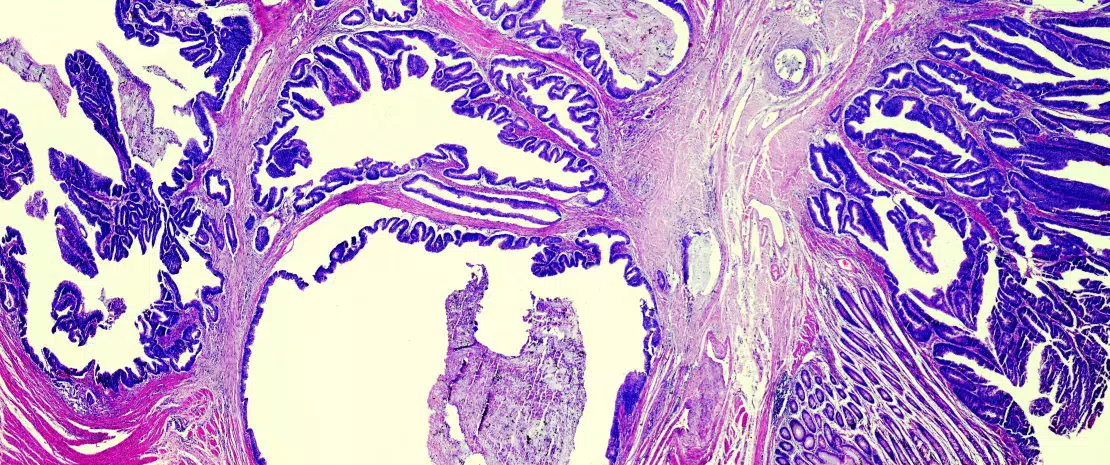Phage therapy: a new way to restore the effectiveness of chemotherapy
A Chinese research team has recently identified a bacterium in the gut microbiota that may be involved in chemotherapy resistance in patients with colorectal cancer. They have also identified a phage capable of specifically targeting this bacterium and restoring tumor sensitivity to treatment.
Lay public section
Find here your dedicated section
Sources
This article is based on scientific information

About this article
Will phages (viruses that target bacteria) soon be part of the therapeutic arsenal for fighting colorectal cancer (CRC)? So suggests a fascinating study published in the journal Cell Host & Microbe. 1
According to the authors, a gut bacterium found in abundance in those who fail to respond to treatment may be responsible for resistance to chemotherapy. Eradicating this bacterium with phages may make it possible to restore the sensitivity of cancer cells to treatment and thus improve patient survival.
To show this, the researchers went through several stages. First, based on the analysis of the microbiota of two independent cohorts of patients (a total of 106 patients, 34 of whom did not respond to treatment), they noticed that the abundance of the bacterium Bacteroides fragilis was significantly higher in non-responders, and that this abundance was correlated with a poorer prognosis.
1.9 million The number of new cases of colorectal cancer worldwide in 2020. ²
930,000 The number of deaths related to colorectal cancer in 2020. ²
A gut bacterium that worsens prognosis
The scientists asked whether B. fragilis was responsible for chemoresistance. To test their hypothesis, they cultured human cancer cells in the presence of B. fragilis and then with two chemotherapy drugs, 5-fluorouracil (5-FU) and oxaliplatin (OXA).
The results indicated that B. fragilis does indeed reduce the sensitivity of cancer cells to chemotherapy, in particular by suppressing chemotherapy-induced apoptosis. These results were confirmed in vivo in the same experiment on mouse models of CRC, with a greater number of tumors present in mice exposed to B. fragilis than in those not exposed, following treatment with 5-FU and OXA.
An RNA analysis of the cells co-cultured with or without B. fragilis and then treated with 5-FU and OXA showed that B. fragilis upregulates the Notch1 metabolic pathway that appears to underlie the chemoresistance of CRC cells.
Fragilis but formidable
The researchers then asked what interactions between the bacteria and cancer cells activated the Notch1 pathway. Using scanning electron microscopy of cells in vitro and in vivo, they observed that B. fragilis did indeed adhere to cancer cells.
According to the authors, on the surface of the bacteria there is a membrane lipoprotein from the SusD/RagB family that is capable of binding specifically to Notch1 receptors on cancer cells. This binding activates the Notch1 signaling pathway and induces the “epithelial-to-mesenchymal transition”, which corresponds to the first stage of cancer cell dissemination (metastases).
3rd most common type of cancer. ²
2nd most common cause of cancer-related death. ²
People over 50 are the most affected. ²
Phages to the rescue
To cap off the study, the researchers identified a phage called VA7 that is capable of specifically eliminating B. fragilis safely and effectively. They administered the VA7 phage to CRC mice that had become chemoresistant following exposure to B. fragilis and found that it completely reversed the induced chemoresistance.
This study is particularly interesting because it shows that:
- An abundance of B. fragilis in the microbiota of CRC patients could serve as a non-invasive biomarker to predict the effectiveness of chemotherapy.
- Combining chemotherapy with VA7 phages in patients with an abundance of B. fragilis could improve clinical response without side effects.
To be continued...
B. fragilis is not the only bacterium that influences the prognosis of colon cancer
According to French researchers, colibactin-producing Escherichia coli (a genotoxic and protumor substance) is also present in abundance in certain colorectal cancers, particularly right-sided colon cancer. 3 This bacterium makes cancer cells less visible to the antitumor immune system and less sensitive to the action of chemotherapy. In 2019, a Chinese study 4 showed that Fusobacterium nucleatum also reduced the effectiveness of 5-fluorouracil.








